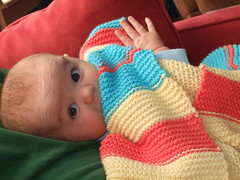"A Chinese policewoman helped save the lives of nine babies by breast-feeding them after they were orphaned or separated from their mothers as a result of the May 12 earthquake."
Wow.
It is nice to hear some sort of uplifting story come out of the earthquake--even one that is tempered by the probable death of the mothers of these babies.
Friday, May 23, 2008
Thursday, May 22, 2008
How one knows that one has had a long day.
This is the assembly for a breast pump that attaches to the breast:

There is the top bit, which has the pump-y stuff that attaches to tubes on the pump itself, and there is the bottom bit, which is a bottle that has been screwed on.
On Tuesday, I set up for my third pumping session of the day. After about ten seconds, I started to wonder why the sound was different. Then I noticed that my skirt was damp. It took me seriously thirty more seconds to realize that I had not screwed the bottle onto either of the pump assemblies, which means that I was pumping milk directly into my lap.

There is the top bit, which has the pump-y stuff that attaches to tubes on the pump itself, and there is the bottom bit, which is a bottle that has been screwed on.
On Tuesday, I set up for my third pumping session of the day. After about ten seconds, I started to wonder why the sound was different. Then I noticed that my skirt was damp. It took me seriously thirty more seconds to realize that I had not screwed the bottle onto either of the pump assemblies, which means that I was pumping milk directly into my lap.
Wednesday, May 14, 2008
Monday, May 12, 2008
Today in misunderstood statistics
Today we will look at seemingly dire statistics that are actually in no way revealing as to the issue at hand. Our example is this website from the National Conference of State Legislatures on US state breastfeeding laws.
In the introductory paragraph, the site quotes stats from a New York Times Article:
"According to the New York Times, approximately 70 percent of mothers start breastfeeding immediately after birth, but less than 20 percent of those moms are breastfeeding exclusively six months later."
For those of you who may not know this, babies are generally introduced to solid foods at four to six months. That means that I would be SHOCKED if more babies were exclusively breastfed at six months. Now, this may actually mean the portion of the baby's diet that comes from breastmilk or formula, but that is not what they say. Breastfeeding support is shockingly low in this country, in large part due to our totally crappy maternity leave policies (look, people, what she said. And I don't even normally like Slate.com all that much, but the whole bit I list below really resonates with me*), but this statistic is unrevealing as to the result of that lack of support.
*Here is the bit I list below: "But the news media and public policy makers still don’t see working families’ issues as economic or public policy questions. Consider: If fathers get pushed off the job, that’s discussed under the heading of labor, business, globalization, world trade, all public issues. But if mothers get pushed off the job—because jobs disappear or are redefined during her maternity leave, or because bosses stop promoting a woman with children on the assumption that she will soon refuse to travel or cut back or go part-time—if mothers get pushed off the job, that’s discussed as women making private emotional choices. How natural: She just wanted to stay home with her baby.
In the introductory paragraph, the site quotes stats from a New York Times Article:
"According to the New York Times, approximately 70 percent of mothers start breastfeeding immediately after birth, but less than 20 percent of those moms are breastfeeding exclusively six months later."
For those of you who may not know this, babies are generally introduced to solid foods at four to six months. That means that I would be SHOCKED if more babies were exclusively breastfed at six months. Now, this may actually mean the portion of the baby's diet that comes from breastmilk or formula, but that is not what they say. Breastfeeding support is shockingly low in this country, in large part due to our totally crappy maternity leave policies (look, people, what she said. And I don't even normally like Slate.com all that much, but the whole bit I list below really resonates with me*), but this statistic is unrevealing as to the result of that lack of support.
*Here is the bit I list below: "But the news media and public policy makers still don’t see working families’ issues as economic or public policy questions. Consider: If fathers get pushed off the job, that’s discussed under the heading of labor, business, globalization, world trade, all public issues. But if mothers get pushed off the job—because jobs disappear or are redefined during her maternity leave, or because bosses stop promoting a woman with children on the assumption that she will soon refuse to travel or cut back or go part-time—if mothers get pushed off the job, that’s discussed as women making private emotional choices. How natural: She just wanted to stay home with her baby.
Subscribe to:
Comments (Atom)


